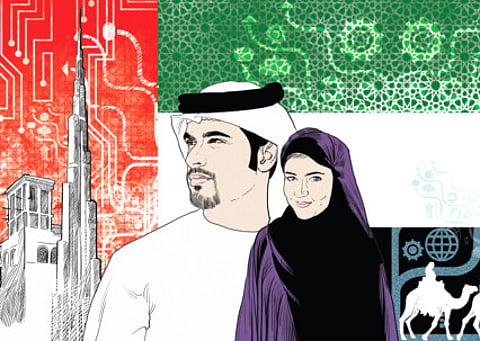UAE’s history of unity is a great example for Arab world
UAE is heading up the effort to articulate positive Islamic values

The UAE approaches its 43rd National Day with unusual confidence as the region faces its greatest challenges for a generation. While civil wars are devastating Syria, Iraq and Libya and Egypt has only just found a new stability, the UAE is taking the lead in offering an alternative vision. During all its 43 years, the UAE has always supported finding answers to regional disputes through cooperation and negotiations rather than war, but it did this while allowing regional heavyweights like Saddam Hussain’s Iraq or Anwar Sadat’s and Hosni Mubarak’s Egypt to take the political lead.
But, recently, the UAE has articulated its own view of how the region should go. In 2011, the UAE was supported by Qatar to get the Gulf Cooperation Council (GCC) to agree that intervention in Libya was essential to save the people from massacre by Muammar Gaddafi. It was this initiative that eventually led to United Nations Resolution 1973 and to Gaddafi’s fall. More recently, the UAE is heading the effort to define the case against the dangerous horror that is seeking to pervert Islam, which is currently led by Daesh (Islamic State of Iraq and the Levant). To this end, in September, His Highness Shaikh Mohammad Bin Rashid Al Maktoum, Vice-President and Prime Minister of the UAE and Ruler of Dubai, articulated the importance that the UAE places on values like enlightened thinking, keeping open minds and tolerance. He was absolutely clear that the struggle against Daesh cannot be won by force alone and he made the UAE part of the holistic drive to discredit the extremists and their malicious ideology carrying their twisted religious overtones and franchise of hate available for any terrorist group to adopt. He urged political leaders and Islamic scholars around the region and the world to lead the charge in building a more positive set of beliefs that will stop a suicide bomber who may be willing to die for Daesh, by offering a stronger ideology that will guide him onto the right path and persuade him that God created us to improve the world, not destroy it.
UAE shows how
The UAE is particularly well-placed to make the case for seeking success through tolerance and working together. Its own history is of seven fiercely independent emirates with their own different histories and identities, coming together and engaging in the difficult process of merging their sovereignties into the one new identity of their new nation. This has not been easy. Different emirates have struggled with each other over their opposing views and even over uncertain borders in some cases. And as in any new federation, there have been grave difficulties in defining where the overarching authority of the federal government gives way to the older but more local authority of the emirate governments. The success of the UAE today is due to the willingness of both the leadership and the people to tackle these issues, and move on to build a secure and confident nation.
Education
This national history has given the UAE the self-confidence to play a more prominent role in regional affairs, but it would not be possible without the benefit of more than 40 years of internal development, which has fundamentally changed the country and given the UAE the immense advantage of a stable and prosperous population of proud Gulf Arabs who are committed to doing their bit in the open-minded world of the 21st Century.
Education has been the key. The UAE made a huge effort to build schools and find teachers so that all its people are able to have the opportunities that education offers. The current debates raging over curriculum and quality of schools and colleges should be seen as a pointer to the way the country’s administrators are willing to tackle a problem and improve on what they are delivering. It is the same spirit that is taking the UAE forward into a new world of innovative industries that will rely on brainpower to make them work in the knowledge economy of the future, leaving the mass production of goods to other more suitable countries with large workforces and traditions of industrial labour.
UAE identity
As the UAE has built its successful economy, it has welcomed millions of foreigners to live in the country. This has created a situation in which the nationals are a minority in their own state, which is why there is now a serious effort to consciously reinforce the national identity. It is important that a young Emirati teenager grows up and is able to speak good Arabic, is proud of his or her country and identifies with its culture and traditions.
This is being done through a wide range of initiatives, ranging from improving the teaching of Arabic in all schools to the recent introduction of compulsory military service, which will both engender patriotism and import useful skills. These and many other activities are building an active and involved citizenry that can take the opportunity of National Day to both look back at where their country has come from and to look ahead and take pride in what the UAE might achieve in the future.



